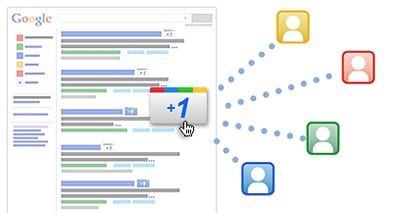It’s been a few weeks since Google announced the introduction of its Plus One (+1) button to search results and websites. Now that the hype has died down let’s assess if this will be a winner and finally allow Google to find its place within the media market . If Google +1 takes off are you ready to take advantage of it?
The Google +1 button is designed to be the Google equivalent of the Facebook Like button. Although it was initially implemented for Google users in the U.S, Google are starting to roll it out to other countries and users in Ireland can now opt in to see the +1button when they do searches on Google.com while logged into their Google account.
The +1 button will appear beside search results and Google AdWords and publishers will also have the ability to place the button on their own website to allow visitors to +1 content they like in the same way that you might Facebook Like a blog post or other content you find on the web. Google recommends that you should ‘Click +1 to publicly give something your stamp of approval.’ The Google Video that explains +1 is available here: http://www.google.com/+1/button/
What’s wrong about +1?
It’s perfectly obvious to everyone that this is Google’s version of the Facebook ‘Like’ button so why not just call it a Like button instead of +1? Facebook can hardly trademark the word ‘Like’ and YouTube which is now owned by Google, also uses a Like button with a thumbs up below videos, so why did Google not just place its own version of a Like button below search results also? It would mean that the concept would be immediately familiar to people instead of having to explain the concept of +1 to them. As we all know any concept that takes a lot of explaining is not likely to be a commercial success.
In action, on search result pages the +1 button is not very obvious and it is faded out until you roll over it so it looks like it is inactive. Also, by placing the +1 button in search results is Google asking people to recommend a website before they have even visited it? Does this mean that Google expects people to remember if they visited that site before and if they liked it to recommend it the next time they see it in a search result?

Since this seems the case it would mean that the Title and Description meta tags that people use on their web pages are now even more important because as well as using these meta tags to help your ranking for keywords and entice people to click on your site in the search results, you may now also have to put some text in your Title or Description tag to encourage people to +1 it when they see it in a search result.
The Facebook Like button works as people have already Liked a business page or friended someone so when they see a status update from them they are much more likely to hit the Like button. The same can not be said for search results or ads as until the person visits the site they really don’t know if they like it enough to recommend or click +1 . The version of the +1 button that publishers can put on their website is much closer to the Facebook Like button in this sense.
Details of the +1 button that publishers can put on their website or blog have not yet been released by Google. You can sign up to be notified when the code is released here: https://services.google.com/fb/forms/plusonesignup/
Personally I’m really looking forward to the WordPress +1 Plugin.
Let’s hope that Google use the Facebook model and do not require people to be logged into their Google accounts to be able to see the +1 button on a website. With Facebook, anyone can see the Like button on a website and when they click it they are propmpted to Login to Facebook to Like or Share the material. Many people with Gmail accounts do not realise that they have a Google account or profile. Google need to increase awareness and improve the messaging around Google accounts and profiles if the +1 button is to have its Facebook moment. Thoughts?


